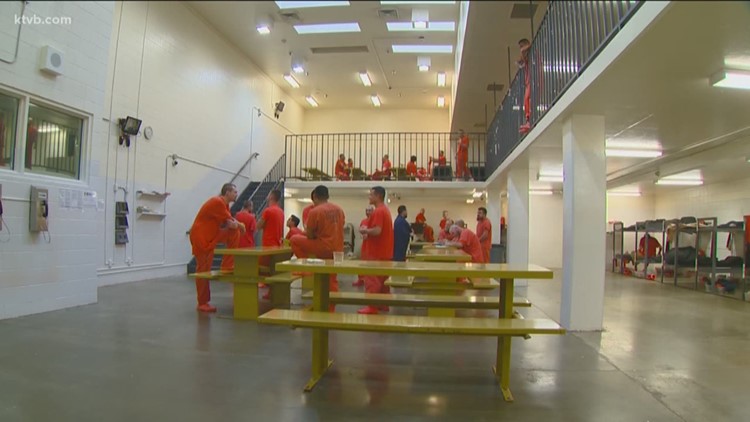CALDWELL, Idaho — Editor's Note: This article was originally published by The Idaho Press.
The issue of drug smuggling at the Canyon County jail turned deadly last December, leading to a renewed push from the sheriff’s office to find a solution.
Two inmates at the county jail in Caldwell have overdosed in the past four months while smuggling in drugs. One of the women survived, but the other died at a local hospital.
County jail Capt. Harold Patchett said visitors and inmates trying to sneak drugs into prisons and jails has been a problem for as long as he can remember. He’s worked in the jail for 18 years, and he said it first started with marijuana and cocaine, but now the big problems are heroin, opioid pills and fentanyl.
The situation came to a head in recent months following the two overdoses.
The overdoses happen because people put drugs in plastic baggies and hide them in body cavities or swallow them. The baggies start to deteriorate when inside the body and the drugs are released into the bloodstream, Canyon County Sheriff Kieran Donahue said.
“There have been a number of incidents, the last two, they were the most extreme,” Donahue said. “And within a couple of months of each other. For me as the sheriff and for me as a person, it galvanized me.”
In December, Georgina Laws died from a drug overdose after being booked into the county jail. According to documents obtained by the Idaho Press, Laws was in the jail booking area when she started to have trouble walking and lost her balance. In the restroom, a female deputy observed that Laws had trouble sitting down and had bitten her lip. Laws’ breathing was also rapid and out of control, the deputy’s report said.
Back in the booking area, Laws fell off the bench she was sitting on, and the deputies called medical personnel. An eight-minute video in the jail shows medical staff and jail deputies attending to Laws, frequently making comments that she was holding her breath and that her heart rate was dangerously low.
Laws was transported to West Valley Medical Center in Caldwell and was set to be transferred to Saint Alphonsus, according to documents. A jail deputy told the Idaho Press that Laws never made it to Saint Alphonsus because she was not stable enough to travel.
The Canyon County coroner’s report said Laws’ cause of death was a methamphetamine overdose. She died around six hours after jail deputies noticed something was wrong.
In March, the county had a close call with an overdose. A woman in jail was rushed to the hospital after she was found unresponsive. According to a memo Donahue sent to county staff, emergency personnel gave the woman Narcan, and she was on a Narcan drip in the hospital for a day.
The woman told hospital staff, according to Donahue’s memo, that she had ingested an extreme amount of pills while in jail. She said she had smuggled them into the facility in a body cavity.
“Just looking at those two cases, they are unfortunate,” Donahue said. “One lady lost her life. She died at the hospital, but she was in my custody and that is a burden to bear as well.” He later added the the cost of these two incidents falls on the taxpayers.
Deputies have also been exposed to dangerous substances. Earlier this month, two Canyon County jail deputies were hospitalized after they were exposed to suspected fentanyl while booking an inmate. After confiscating the substance, the deputies began experiencing symptoms related to fentanyl exposure. Both were transported to a hospital for treatment and have since been released.
The sheriff’s office is trying to address the problem with a body scanner X-ray machine. The county may start accepting bids for a machine for the jail soon. The machine, which basically looks like the TSA machines at the airports, Donahue said, would be used to find contraband hidden in body cavities during the booking process.
During the booking process, deputies pat suspects down through one layer of clothing. If the detainees are not bonded out of the jail, the deputies do a more intense search when individuals take off their clothes and before they are asked to put on the jail uniform.
The Ada County Sheriff’s Office purchased a body scanner machine for its jail in 2019. The scanner has provided the department with an “effective (way) to keep drugs out of the jail,” the office’s spokesman Patrick Orr said in an email.
The office also purchased a mail scanner because it found that people were mailing strips of suboxone, a drug that’s often used to treat opioid addiction but can give someone a similar high to an opioid if taken in large doses.
ince Jan. 1, 2020, the jail had 212 incidents involving drugs or alcohol in the jail, Orr said. Of those, 160 were in the booking area. The drugs or paraphernalia were found and confiscated as people were processed into the jail.
The others were caught either in the closed custody unit, which is the first place someone goes after booking before they go to their regular housing in the jail or were incidents of people taking prescription drugs that were prescribed to someone else and a few other incidents were from people attempting to make alcohol from fruit, bread or water, Orr said.
“Without getting too graphic, some people will go to some pretty extreme efforts to conceal drugs — and the body scanner doesn’t catch everything,” Orr said.
The Ada County jail does not have any reports of drug overdoses in its general jail population since 2016, Orr said. In 2014, a federal inmate died of an overdose.
Donahue believes that the scanner would act as a deterrent, even if it doesn’t catch everything.
There has been some pushback from Canyon County elected officials about the cost of the requested X-ray machine. Donahue said the machine costs about $200,000.
“We have been trying to address this for years without going to that major expense because the county budget is always a problem,” Donahue said. “But to me, we just can’t wait. We have got to quit talking about it and do it.”
There is a potential option to use federal COVID-19 funding to purchase the scanner, Donahue said. He said when checking individuals for drugs or paraphernalia, deputies often must get close to people and have them cough or breath deeply, potentially putting them at risk for the virus.
Rachel Spacek is the Latino Affairs and Canyon County reporter for the Idaho Press. You can reach her at rspacek@idahopress.com. Follow her on Twitter @RachelSpacek.



